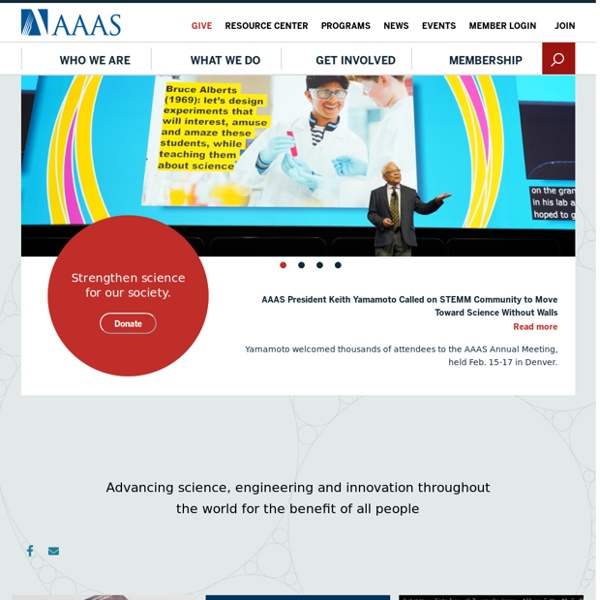



Publications - Journals by Subject Ocean Science (OS) is an international open access journal dedicated to the publication and discussion of research on all aspects of ocean science, experimental, theoretical and laboratory. OS covers the fields ocean physics, ocean chemistry, biological oceanography, air-sea interactions, ocean models (physical, chemical, biological and biochemical), coastal and shelf edge processes, and paleoceanography. Aims & Scope | Editorial Board | Online Library OS | Online Library OSD NOVA Can Wind Turbines Make You Sick? Residents living in the shadows of wind turbines say the sound is making them sick. But so far the science isn't there. From NOVA Next | Jun 27, 2018
Funding - Core Techniques and Technologies for Advancing Big Data Science & Engineering Directorate for Computer & Information Science & Engineering Critical Techniques and Technologies for Advancing Big Data Science & Engineering (BIGDATA) Solicitation 14-543 Full Proposal Deadline Date: June 9, 2014 This year, the solicitation invites two types of proposals: "Foundations" (F): those developing or studying fundamental techniques, theories, methodologies, and technologies of broad applicability to Big Data problems; and "Innovative Applications" (IA): those developing techniques, methodologies and technologies of key importance to a Big Data problem directly impacting at least one specific application. All proposals must address critical challenges for big data management, big data analytics, or scientific discovery processes impacted by big data.
Journal home : Nature Raphael Lis, Charles C. Karrasch, Michael G. Poulos, Balvir Kunar, David Redmond, Jose G. Barcia Duran, Chaitanya R. Badwe, William Schachterle, Michael Ginsberg, Jenny Xiang, Arash Rafii Tabrizi, Koji Shido, Zev Rosenwaks, Olivier Elemento, Nancy A. Journals PLOS publishes seven peer-reviewed open-access journals. The journals vary in their selectivity and contain differing amounts of commentary articles from opinion leaders in a variety of scientific disciplines.The journals are editorially independent. They include PLOS ONE, which publishes all rigorous science across the full range of life and health sciences; the community journals (PLOS Genetics, PLOS Computational Biology, PLOS Pathogens, and PLOS Neglected Tropical Diseases); and our flagship journals, PLOS Medicine and PLOS Biology, highly selective journals publishing fewer than 10% of submissions along with a range of informative and influential non-research content. You can search the journals for specific articles here and you can sign up for e-mail Content Alerts for all our journals here.
Common Misunderstandings of Evolution: Part 1 While an open and honest debate is always a good thing, most of the time, when people are pointing out “problems” in evolution, their qualms arise from a misunderstanding of what evolution actually is and how the mechanisms of evolution actually function. Below are some of the most common misconceptions (or questions) in evolution and how science answers these concerns. Q1.)
popsci At the nuvera fuel cells lab in Cambridge, Massachusetts, 25-year-old chemical engineer Darryl Pollica stands in front of a prototype 5-kilowatt fuel cell -- a miniature powerplant that can make most of the electricity needed by a family of four. Its metal skin has been removed to reveal a cubical frame about 5 feet on each side, packed with tanks, valves, and electronics. Conspicuously taped to the outside of the frame is a Nokia cellphone. "That's our mascot," Pollica says. "We want to shrink this," he says, opening his arms as if to embrace the entire assembly, "to this," and he brings them together and points toward the tiny phone.
Synthetic Biology "Synthetic biology" is an umbrella term that refers to a new set of powerful techniques for manipulating the fundamental molecular structures of life, including genes, genomes, cells and proteins. Techniques being developed under the "synthetic biology" rubric include the modification of existing bacteria to produce useful substances or perform new functions, the creation of novel artificial organisms from "scratch," and — less noted to date — the modification of animal and human genes. Synthetic biologists foresee a host of human applications, including new methods to produce drugs, biofuels and vaccines; to diagnose, prevent and cure disease; and — far more controversially — to screen, select, and modify genes for specified traits in embryos, children, and adults. Nonetheless, the field remains in its early days, and separating hype from real potential remains difficult. Such prospects raise concerns for social justice, human rights, and equality.
Google’s smart contact lens: What it does and how it works It’s a question that Google officials have clearly thought a lot about, said Joseph Lorenzo Hall, chief technologist at the Center for Democracy & Technology, who was briefed on the lens before the company’s Thursday announcement. Hall said that Google assured him that the data would not be added to the company’s banks of personal information gathered from other services. “The data will never hit Google’s servers,” he said. “That’s a forward-thinking affirmative claim that they’re making.
Science Illustrated Meerkat Magic Some of the magic moment of filming meerkats for the BBC’s Planet Earth Live. Technology meets fashion XFINITY Connect: Oral History Your Privacy is a Priority Facebook Connect allows you to use your Facebook credentials to login to certain portions of XFINITY TV and XFINITY.com. Comcast does not send your Comcast account or billing information to Facebook as part of this connection process. You can read more about which portions of XFINITY TV and XFINITY.com support Facebook Connect, here.